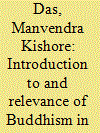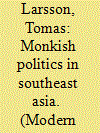| Srl | Item |
| 1 |
ID:
102149


|
|
|
| 2 |
ID:
139665


|
|
|
|
|
| Summary/Abstract |
In the Theravāda Buddhist polities on the mainland of Southeast Asia, abiding concerns about the proper structuring of the relationship between the ‘two wheels of dhamma’ (i.e. the realm of religion and the realm of politics) have had a profound influence on processes of state formation and political legitimation. This article explores one such religious ‘effect’ on the constitutions and electoral laws of modern Burma/Myanmar, Siam/Thailand, Cambodia, and Laos, namely the official disenfranchisement of Buddhist monks (and, in some instances, Buddhist ‘nuns’ as well as non-Buddhist clergy). The article traces the historical evolution of this Buddhist exception to the democratic principle of equal and universal suffrage, and assesses the extent to which dominant theoretical approaches in the social sciences help us to understand the politics of religious disenfranchisement in Southeast Asia. It finds that neither secularization theory nor the religious-economy approach can explain observed patterns. Instead, the article offers an account of the politics of religious disenfranchisement that emphasizes the role of ideas and historical context.
|
|
|
|
|
|
|
|
|
|
|
|
|
|
|
|
| 3 |
ID:
108965


|
|
|
|
|
| Publication |
2011.
|
| Summary/Abstract |
This article draws upon recently-gathered anthropological and other data from Cambodia to explore how some Cambodians move beyond the constraints of social differentiation and order to access higher realms of meaning. This enables communion, security and liberation from social patterns of misrecognition. Gender is one of the primary principles of social differentiation and in recent years the relationship between gender, security and development has attracted the interest particularly of feminist scholars. Attention is often focused upon the misogynistic aspects of gender differentiation. Proponents of this kind of discourse tend not to concern themselves with how women and men may actually transcend rather than challenge gender order or with how they may commune with one another in ways that generate security. Focusing instead on the notions that are meaningful to the members of a given society may reveal some of the shortcomings of current security, development and feminist discourse. The material presented here is analysed by adapting some of the ideas that Roy Rappaport developed in his study of the 'cognized models' and liturgical rituals of the Maring of New Guinea. Rappaport's model helps to reveal how, by navigating multiple and overlapping levels of meaning, Cambodians may negotiate and even invert social order in ways that can be transformative, emancipatory and healing.
|
|
|
|
|
|
|
|
|
|
|
|
|
|
|
|